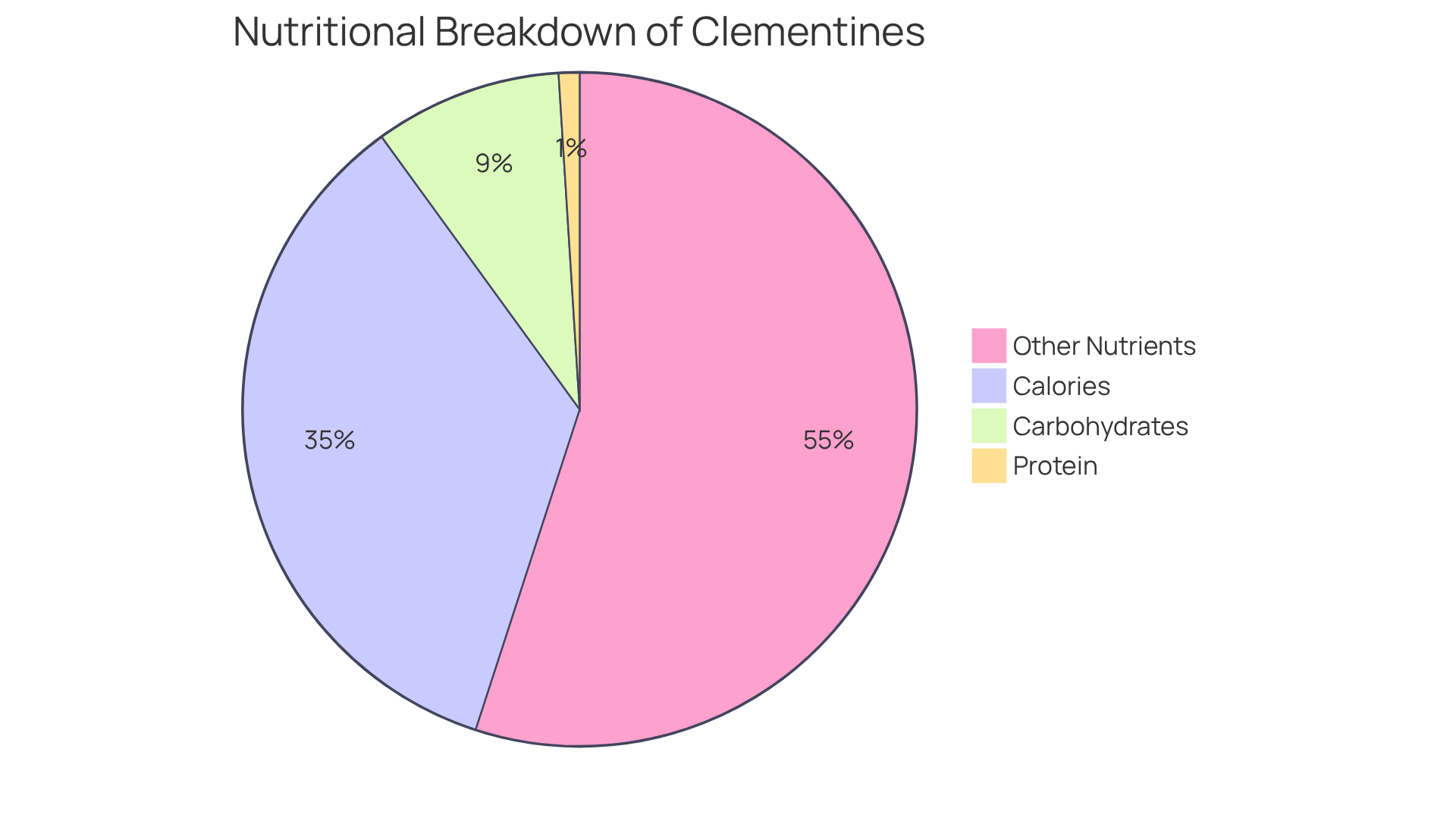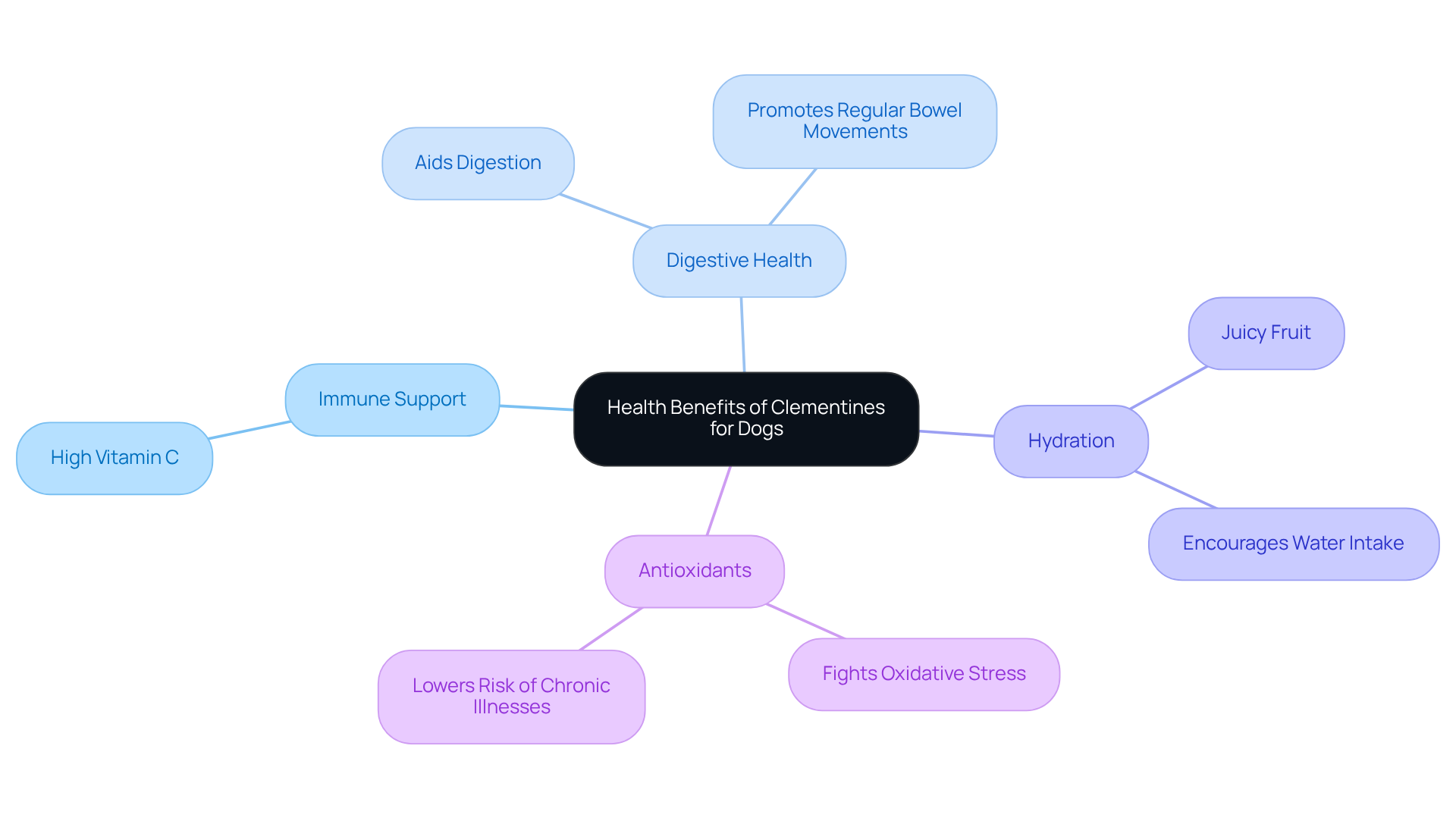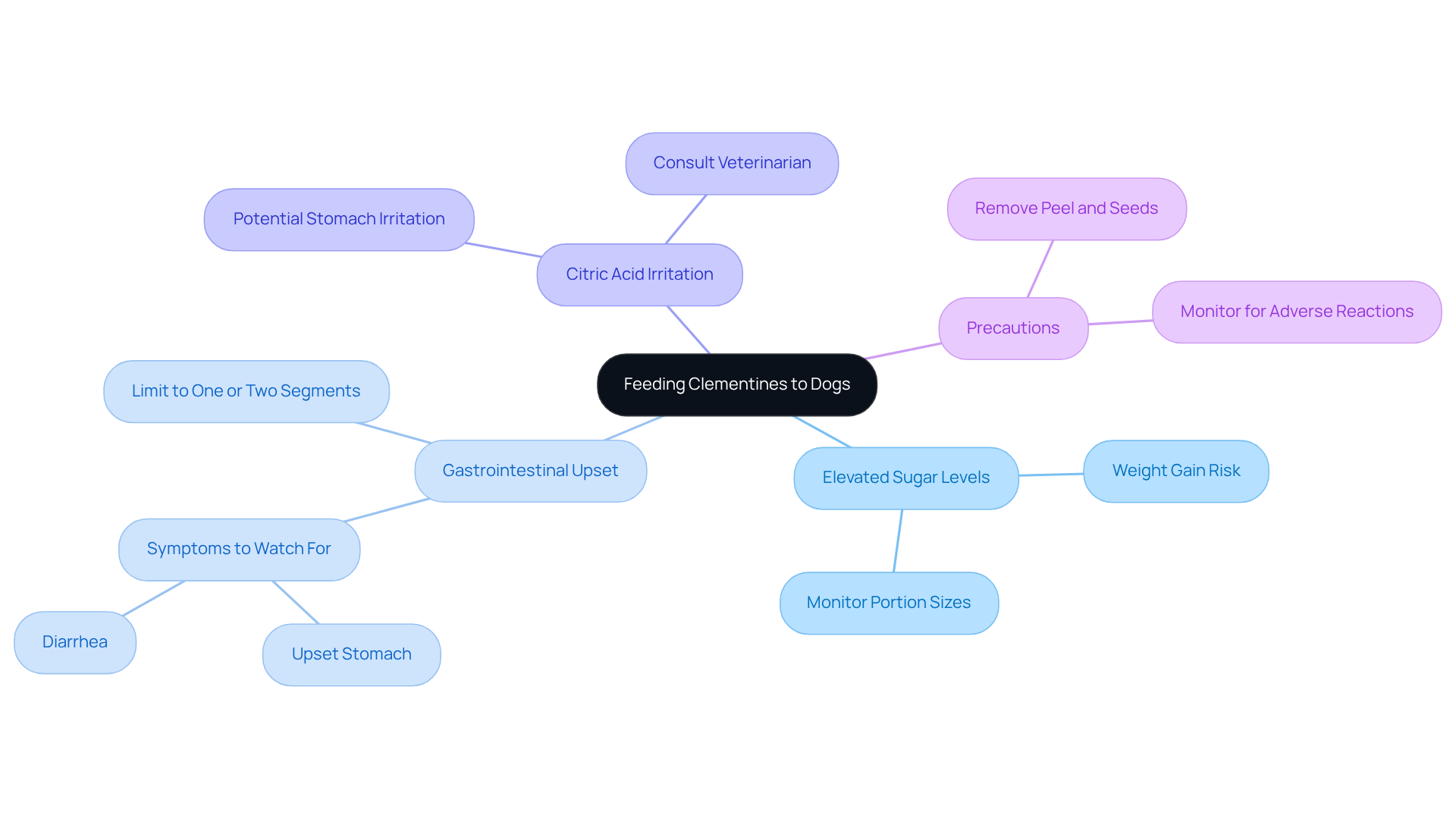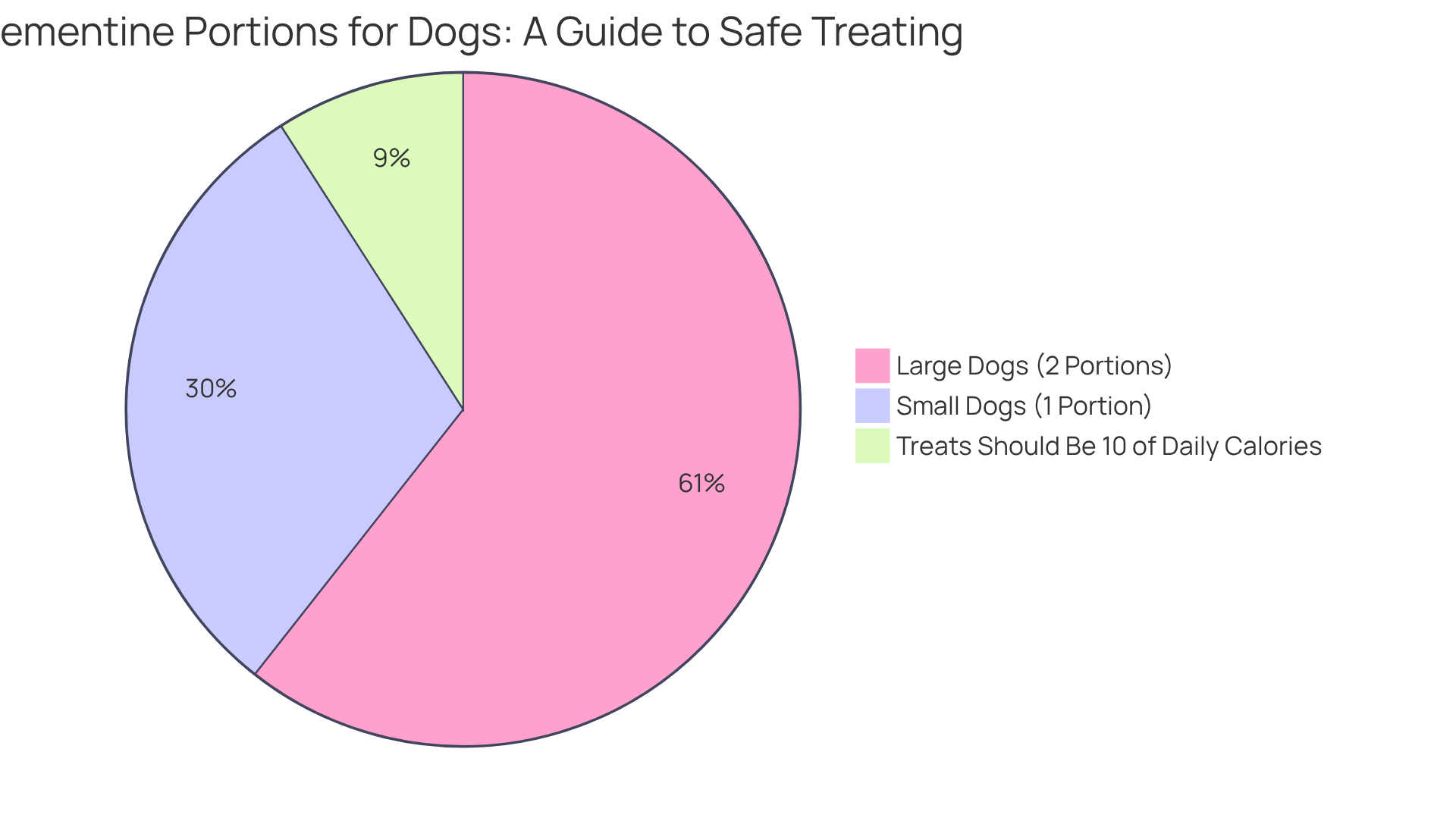Can Dogs Have Clementines? Understanding Benefits and Risks
Overview
As a loving pet owner, you may wonder if your furry family members can enjoy clementines. The good news is that, in moderation, these delightful fruits can offer health benefits such as immune support and hydration. However, it’s important to be aware of the risks associated with their sugar and citric acid content.
While clementines can serve as a nutritious treat, it’s advisable to limit their intake to just 1-2 segments per day. Always keep an eye on your dogs for any adverse reactions, ensuring their overall well-being. By taking these precautions, you can create a nurturing environment that supports your pet’s health and happiness.
Introduction
Clementines, with their vibrant flavor and impressive nutritional profile, are a beloved snack for many. But as a caring pet owner, you might wonder: can your furry family members enjoy this citrus delight too? These small fruits are packed with vitamin C, fiber, and antioxidants, all of which can contribute positively to a dog’s overall health when offered in moderation.
However, it’s important to consider the potential risks associated with their sugar content and citric acid. This raises a crucial question: do the benefits truly outweigh the concerns? How can you navigate the fine line between treating your pets and ensuring their well-being? As you ponder this, remember that understanding their needs is the first step toward a nurturing environment.
Understanding Clementines: Definition and Nutritional Value
Clementines (Citrus × clementina) are delightful, small citrus fruits that stem from a hybrid between the willowleaf mandarin and the sweet orange. Their easy-to-peel skin and seedless segments make them a favored snack for both children and adults, but can dogs have clementines as well? Each mandarin orange contains approximately 35 calories, 1 gram of protein, and 9 grams of carbohydrates, while providing around 40% of the daily recommended value of vitamin C. They are also a good source of dietary fiber, potassium, and antioxidants, all of which play a crucial role in supporting overall health.
For pet owners considering adding mandarins to their pets’ diets, understanding these nutritional advantages is essential. When provided in moderation, these fruits can lead to the question of can dogs have clementines, as they offer dogs immune support, hydration, and vital nutrients that positively impact their well-being. However, it’s important to remember that while can dogs have clementines, these small citrus fruits contain natural sugars and citric acid, which may not suit every dog’s digestive system. Therefore, it’s recommended to limit clementine intake to 1-2 segments per day, depending on your dog’s size and weight.
As a caring pet owner, you should also observe your pets for any negative responses, especially if they have prior medical issues. By nurturing their diets with thoughtful choices, you can help ensure that your beloved companions thrive.

Health Benefits of Clementines for Dogs
When given in moderation, clementines can offer wonderful health benefits for your furry family members, raising the question of can dogs have clementines. With their high vitamin C content, these fruits help support your dog’s immune system, making it easier for them to fend off illnesses. Additionally, the dietary fiber found in clementines aids in digestion, promoting regular bowel movements and overall digestive health.
Moreover, the hydration provided by this juicy fruit is particularly beneficial for dogs that may not drink enough water. And let’s not forget the antioxidants present in clementines, which can assist in fighting oxidative stress, potentially lowering the risk of chronic illnesses.
However, it’s essential to remember that while considering the question of can dogs have clementines, these benefits shine brightest when clementines are offered as an occasional treat rather than a staple of their diet. By incorporating this delicious fruit into your dog’s diet mindfully, you can nurture their health while also treating them to something special.

Risks and Precautions: What to Consider Before Feeding Clementines to Dogs
When considering if dogs can have clementines, it’s important to note that they can be a delightful and safe snack for your furry family members when offered in moderation, but it’s essential to consider a few important risks. The elevated sugar levels in mandarins may contribute to weight gain, a significant concern given that 61% of felines and 59% of canines in the U.S. are classified as overweight or obese. Excessive consumption can lead to gastrointestinal upset, especially in dogs with sensitive digestive systems, so it’s important to consider if dogs can have clementines. Additionally, the citric acid found in mandarins brings up the question of if dogs can have clementines, as it can irritate a dog’s stomach, potentially exacerbating issues for those already facing health challenges like diabetes or obesity.
As a caring pet owner, it’s crucial to take precautions. Always remove the peel and any seeds before sharing this fruit, as these parts can pose choking hazards or lead to digestive complications. Depending on their size and breed, it’s important to consider if dogs can have clementines, allowing them only one or two orange segments daily. It’s also important to monitor for any adverse reactions after introducing the fruit, especially in relation to the question of if dogs can have clementines, particularly for those with pre-existing conditions. Consulting a veterinarian before adding new foods to your dog’s diet is always a wise choice. In fact, only 43% of pet owners reported that their veterinarian annually discusses their pet’s optimal weight or body condition. This proactive approach ensures that you make informed decisions about your beloved companions’ health.
At Adventure Den, we understand that your pet’s well-being is your top priority. By taking these simple steps, you can nurture a healthy and happy environment for your pets. Remember, your furry family members deserve the best care possible.

Serving Suggestions: How Much Clementine Can Dogs Safely Eat?
When it comes to the question of can dogs have clementines, moderation is key to your furry family member’s well-being. For small dogs, it’s best to limit their enjoyment to just one portion per day, while larger dogs can safely indulge in up to two portions. Renowned veterinarian David Dilmore advises, “I recommend that you only give 1 or 2 segments per day. Any more than that can lead to obesity or other issues.”
It’s important to introduce this delightful fruit gradually, observing how your pet responds, especially since it raises the question of whether can dogs have clementines, as some dogs may be more sensitive to citrus, which could lead to minor stomach upset. Always serve peeled mandarins with any seeds removed to ensure their safety. As a helpful guideline, treats—including those sweet clementines—should make up no more than 10% of your dog’s daily caloric intake, helping to maintain a balanced and healthy diet.

Conclusion
Clementines can truly be a delightful addition to your furry family members’ diets when offered with care and moderation. With their high vitamin C content, dietary fiber, and hydration, these fruits can support your dog’s immune system and overall well-being. However, it’s important to recognize that clementines also contain natural sugars and citric acid, which may not be suitable for every dog, particularly those with specific health concerns.
Moderation is key. For small dogs, limiting to just one segment is advisable, while larger dogs may enjoy up to two segments. Remember to remove the peel and seeds to prevent choking hazards, and always monitor for any adverse reactions when introducing clementines into their diet. Consulting with your veterinarian before making any dietary changes is a wise step to ensure your pet’s health and happiness.
In conclusion, while clementines can provide health benefits for dogs, they should be treated as an occasional treat rather than a dietary staple. By making informed choices and prioritizing moderation, you can enhance your furry companions’ diets and contribute to their overall health and joy. Embracing a thoughtful approach to pet nutrition not only fosters better health but also strengthens the bond between you and your beloved pets.
Frequently Asked Questions
What are clementines and how are they classified?
Clementines (Citrus × clementina) are small citrus fruits that are a hybrid between the willowleaf mandarin and the sweet orange.
What nutritional value do clementines provide?
Each clementine contains approximately 35 calories, 1 gram of protein, and 9 grams of carbohydrates. They provide around 40% of the daily recommended value of vitamin C and are also a good source of dietary fiber, potassium, and antioxidants.
Can dogs have clementines?
Yes, dogs can have clementines in moderation. They can provide dogs with immune support, hydration, and vital nutrients that positively impact their well-being.
How many clementines can I give my dog?
It is recommended to limit clementine intake to 1-2 segments per day, depending on your dog’s size and weight.
Are there any precautions to consider when giving clementines to dogs?
Yes, while clementines can be beneficial, they contain natural sugars and citric acid, which may not suit every dog’s digestive system. It’s important to observe your pet for any negative responses, especially if they have prior medical issues.







